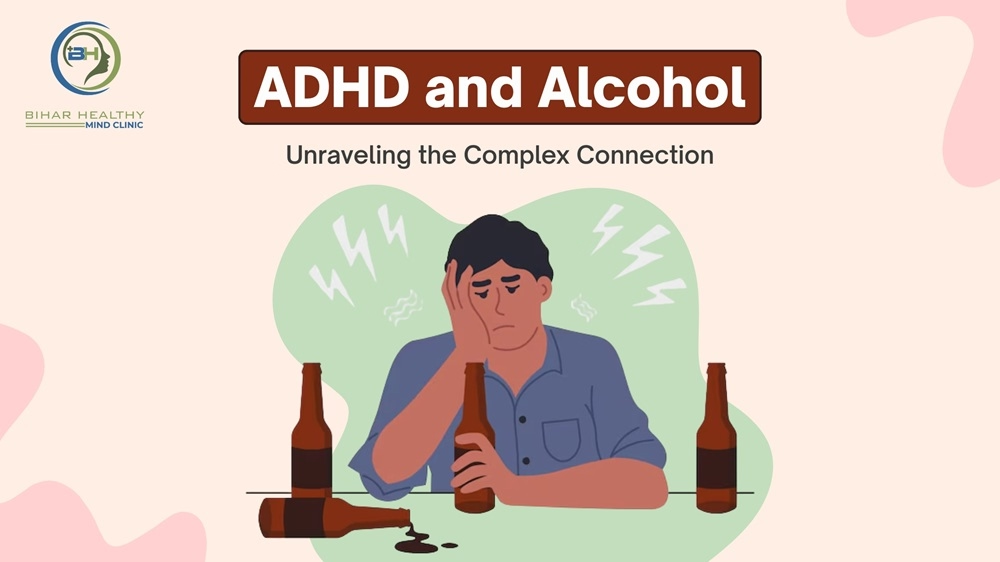
Attention-Deficit/Hyperactivity Disorder (ADHD) is widely recognized as a neurodevelopmental condition that affects focus, self-control, and daily functioning. While ADHD itself presents considerable challenges, the situation becomes far more complex when coupled with alcohol use or dependency. The comorbidity of ADHD and alcohol consumption is a growing concern in psychiatric practice, as the interaction between the two can significantly worsen mental health outcomes and complicate recovery pathways.
At Patna Psychiatry, under the care of Dr. Saurabh Kumar, MD (Psychiatry), individuals receive specialized treatment tailored to such intertwined conditions. Recognized as the Best psychiatrist in Patna, Dr. Kumar emphasizes holistic management that not only addresses symptoms but also strengthens coping mechanisms for long-term recovery.
The Link Between ADHD and Alcohol Use
Research has consistently highlighted that people with ADHD are more likely to develop substance use problems, particularly involving alcohol. This is not merely coincidental; there are neurobiological and psychological reasons for this association.
- Impulsivity and Risk-Taking: ADHD often involves heightened impulsivity, which can lead individuals to experiment with alcohol earlier and in more frequent patterns than peers.
- Self-Medication Hypothesis: Alcohol may temporarily dull restlessness, improve sleep, or create a sense of calm, leading those with ADHD to use it as a form of self-medication.
- Reward System Dysregulation: ADHD is associated with irregular dopamine activity in the brain. Alcohol, which increases dopamine release, may temporarily provide relief, reinforcing its use.
Unfortunately, while alcohol may seem to ease symptoms in the short term, it often exacerbates them over time, creating a cycle of dependency that worsens both conditions.
Challenges of Comorbidity
The coexistence of ADHD and alcohol use presents unique difficulties in diagnosis and treatment.
- Diagnostic Overlap: Symptoms of alcohol misuse such as poor concentration, forgetfulness, and impulsivity may mimic ADHD, making it hard to distinguish whether the root cause is one disorder or both.
- Greater Impact: Alcohol often intensifies the challenging features of ADHD, such as mood swings, irritability, and poor decision-making.
- Functional Impairment: When both conditions occur together, individuals may face significant disruption in education, employment, relationships, and personal well-being.
- Higher Relapse Rates: Individuals with ADHD who undergo alcohol recovery often experience higher relapse rates compared to those without ADHD, emphasizing the need for specialized interventions.
Long-Term Consequences
-
The dual impact of ADHD and alcohol use disorder can be devastating if left unaddressed:
- Cognitive Decline: Persistent alcohol misuse impairs memory, executive function, and learning - areas already vulnerable in ADHD.
- Emotional Disorders: Coexisting depression, anxiety, or bipolar symptoms are more likely to appear in patients dealing with both ADHD and alcohol problems.
- Social and Legal Issues: Risky behaviors, impulsive decision-making, and poor self-regulation increase the likelihood of accidents, conflicts, and even legal challenges.
- Physical Health Risks: Liver damage, cardiovascular issues, and poor sleep cycles worsen overall health outcomes.
Treatment Approaches
Managing the dual challenges of ADHD and alcohol misuse requires a comprehensive, multi-pronged strategy. At Patna Psychiatry, treatment plans are carefully customized to address both conditions simultaneously.
- Accurate Diagnosis: A detailed clinical evaluation helps distinguish symptoms of ADHD from alcohol-related effects, ensuring that neither condition is overlooked.
- Medication Management: Stimulant and non-stimulant medications may be prescribed for ADHD, but their use requires close monitoring when alcohol misuse is present. In many cases, non-stimulant alternatives are preferred to minimize risks.
- Psychotherapy: Cognitive Behavioral Therapy (CBT) is highly effective in addressing maladaptive thought patterns, improving self-control, and reducing reliance on alcohol.
- Motivational Interviewing: This therapeutic approach helps patients explore the underlying reasons for their alcohol use and strengthen their resolve to change.
- Lifestyle Modifications: Regular exercise, structured routines, balanced nutrition, and mindfulness practices aid in reducing ADHD symptoms and supporting recovery from alcohol dependency.
- Family and Community Support: Involving family members and support groups fosters accountability, enhances emotional support, and creates an environment conducive to long-term healing.
Preventive Strategies
While treatment is essential, prevention plays a critical role in reducing the risks of comorbidity.
-
Families, educators, and medical experts can collaborate to:
- Identify ADHD early and begin appropriate interventions.
- Educate adolescents about the dangers of alcohol use, particularly for those with ADHD.
- Encourage healthy coping mechanisms such as sports, hobbies, and stress-management practices.
- Provide continuous follow-up care to monitor behavior and address challenges before they escalate.
Why Choose Patna Psychiatry?
Dealing with ADHD and alcohol misuse is not just about treating two conditions—it is about restoring balance, hope, and purpose in an individual’s life. At Patna Psychiatry, Dr. Saurabh Kumar, MD (Psychiatry), provides evidence-based, compassionate care that integrates modern psychiatric practices with personalized attention. With his expertise, patients not only receive treatment for their symptoms but also gain tools to navigate daily challenges more effectively.
When seeking the Best psychiatrist in Patna, patients and families can trust that their concerns will be met with empathy, confidentiality, and comprehensive care.
Final Thoughts
The comorbidity of ADHD and alcohol misuse is a serious challenge that requires prompt recognition and tailored intervention. Left untreated, the consequences can ripple across every area of life. However, with professional support, recovery is entirely possible. At Patna Psychiatry, evidence-based approaches empower individuals to break the cycle of dependency, manage ADHD symptoms effectively, and regain control over their future.
If you or a loved one is struggling with this dual challenge, reaching out for help is the first step toward long-lasting healing.
Disclaimer: All characters and events depicted in this blog are entirely fictional. Any resemblance to actual persons, living or dead, is purely coincidental. The content is intended for informational purposes only and should not be considered as medical advice. Always consult a qualified healthcare professional for medical concerns.
Visitors: 71





No comments yet.